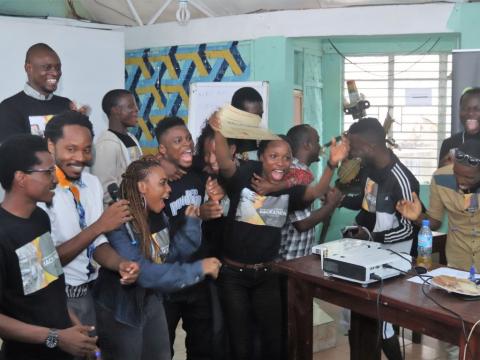By Kemo Cham
Ten young Sierra Leonean programmers have won a Le38million award to develop a mobile payment solution that may hold the answer to some of the problems facing the local public transportation system.
The team of young programmers were declared winners for their idea at the just concluded Urban Mobility Hackathon organized by the technology firm, Sensi Hub, in collaboration with government agencies in the transportation sector, including the Ministry of Transport and Aviation and Sierra Leone Road Transport Corporation (SLRTC).
Ishmael Kargbo, a 22 year-old developer and graduate of the Blue Crest College, led the team of Mobility Hackers to create an idea for the $4000 prize on SwiftPay. SwiftPay uses Unstructured Supplementary Service Data (USSD) to allow users to make mobile payments to purchase bus tickets.
Other members of Kargbo’s team include: Mariam Cremelda Conteh (22), Mohamed Lamin Kargbo (23), Alhassan Turay (21), Tejan Kamara (23), Peter Joshua Conteh (26), Princess Koroma (23), Walter Marvey-John (27), Abdulai Bah and Sarah Blessing Kargbo. The youngsters competed against 10 other teams comprising 105 first-time and seasoned hackers who came together to develop solutions to improve urban mobility (capturing the movement of people in cities using urban transportation systems).
Hackathons are events in which programmers, designers, those involved in computer software development and problem-solvers come together to solve problems with innovative ideas.
The Urban Mobility Hackathon which was funded by the World Bank Group is part of a drive to create an ecosystem to support its integrated and resilient urban mobility project in Sierra Leone.
Sensi Hub, through the technical support of the Directorate of Science, Technology, and Innovation (DSTI), received a grant of US $48,851,33 from the World Bank to organize and manage the hackathon which was preceded by a one-day workshop designed to train participants on the tools and technologies for processing and analyzing large-scale data from cellular phones, referred to as Call Detail Records (CDRs).
Over fifteen participants representing Ministries, Departments and Agencies (MDAs), Sensi Tech and other private sector entities attended the workshop.
Data scientists and software developers from DSTI provided technical support and mentorship to the teams to build prototypes/tools, including guidance on how to improve and scale their prototype during the hackathon.
Ishmael Kargbo and his team members met for the first time at the three-day event hosted by Sensi Hub, an organization that creates spaces for young people to develop skills for innovation, technology, and entrepreneurship.
Kargbo was quoted saying that he felt intimidated when he first appeared at the event and seeing so many hackers in the room.
“When I came in on the first day I was afraid seeing developers, innovators, entrepreneurs gathered in one place,” he said, according to a report on the website of the DSTI.
“We were the second team to pitch our ideas, and after listening to presentations from the other teams, we were sure that ours was the winning idea and this is because all the other teams had ideas that made sense but was difficult to implement. Ours, on the other hand, was easier to implement and easier to use,” said Kargbo.
Kargbo and his team will now spend the next three months working under the mentorship of technologists at Sensi Tech and DSTI who will provide them the administrative, and technical support to develop the prototype for their winning idea.
A major beneficiary institution of the idea is the SLRTC, which hopes to put an end to recurrent losses under the current system of ticket sales by conductors on board its buses.
A representative of SLRTC said during a presentation on the first day of the hackathon that when bus conductors sell tickets, the amount of money they present always doesn’t add up to the number of tickets they are given.
Officials said the goal of the hackathon was to actively engage the public, especially problem-solvers, as a means of strengthening the entrepreneurial and tech ecosystems.
“We are here to create solutions to help facilitate the process of solving a problem around the issues we’re having in moving people and goods across our city,” Morris Marah, Founder, and Director of Sensi Hub, said, citing issues of safe roads, smart parking, disaster management, environment safety as among many that needs solving.
“All of these things are issues we have at large in our city,” he added.
“We are creating opportunities that bring together change agents, tech operators like Sensi, hackers, donors, and Ministries, Departments, and Agencies as we work collectively to make Sierra Leone an innovation nation,” said Mahmoud Javombo, Ecosystems Manager, DSTI.
© 2019 Politico Online









